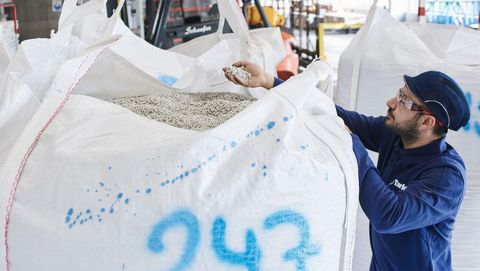Members
Tarkett: creating a closed-loop system across the value chain

Operating across 100 countries worldwide, Tarkett is a worldwide leader and manufacturer of innovative and sustainable flooring. With the construction industry responsible for approximately 40% of greenhouse gas emissions and 60-70% of global waste, Tarkett hopes to set the benchmark within the sector through its circular economy model.
Changing expectations for businesses
For Tarkett, clients continually face increased expectations regarding sustainable and responsible development.
With installers and contractors, for example, flooring needs to be easy to install, remove, collect, and then be recycled post-installation to avoid waste.
In addition, for building and property owners, meeting sustainability goals and gaining third-party accreditation has gained paramount importance. It is vital to be able to demonstrate the sustainability of product materials as well as their end-of-life recycling capabilities.
ReStart®: Creating a circular economy
Tarkett has identified raw material extraction and end-of-life disposal (mainly via incineration) as the main sources of its carbon emissions – so finding ways to act on these is key to the company’s sustainability strategy.
On a practical level, this involves sourcing recycled and renewable materials for products, including waste products from other industries.
Tarkett has recognised two simple criteria for a recyclable product: a process to collect it at the end of its life and a proven technology to recycle it. The company has demonstrated its commitment to both of these, and thereby to building a circular economy, through its ReStart® recycling programme.
This scheme aims to collect waste – both installation offcuts and old floors – and recycle it into new Tarkett flooring products at one of nine dedicated recycling centres worldwide.
Obviously, a programme of this kind can help businesses to save on energy, but it also helps Tarkett to reduce its own carbon footprint.
“We collaborate with key stakeholders across the supply chain to ensure we are maximising the potential of recovering this material during installation and post-use,” says Ross Dight, Tarkett’s Technical and Sustainability Director. “When they send us back their materials, it prevents them from being landfilled or incinerated and means we are less reliant on extracting valuable virgin raw materials.”
Tarkett is also careful to monitor the process to make sure its commitments are being upheld.
“You can’t do any of this without a local take-back scheme that actually works,” Dight explains. “We can put out all the publicity we want regarding the ReStart programme, but the execution needs to be as good as the technical capability.”

2030 vision
Last month, Tarkett announced its new 2030 Climate Roadmap – a strategic programme committing the company to respecting the Paris Climate Agreement goal of limiting global warming to 1.5C. To facilitate this, Tarkett will aim to cut greenhouse gases across its whole value chain by 30% by the end of the decade.
The plan is currently being scrutinised by the Science Based Targets initiative (SBTi), a global body helping business to set targets for emissions reduction based on the latest scientific data relating to climate change.
Part of this involves developing awareness among Tarkett’s own employees, through activities like company-wide sustainability days. The first of these events took place last December.
“Wherever they were based, everyone was encouraged to think of new ideas,” says Dight. “It was an excellent opportunity to get the team to step back and really focus on what we do as a business.”
Dight regularly collaborates with Tarkett’s sustainability leads in other European countries, allowing the company to stay up to date on best-practice ideas and particular trends to look out for.
“Practices that were widely accepted ten years ago – like carbon offsetting schemes – are now no longer seen as sustainable approaches,” he observes. “We’ve now got a much better idea of where our emissions come from and our recycling innovations are allowing us to showcase things that actually will have a tangible impact on the planet.”
Tarkett is a world leader in sustainable and circular flooring and sport surfaces solutions. It offers one of the broadest product portfolios for the housing, healthcare, retail, hospitality, education, workplace and sports sectors.
Tarkett are the sponsors of the our 'Towards Net Zero' campaign.
